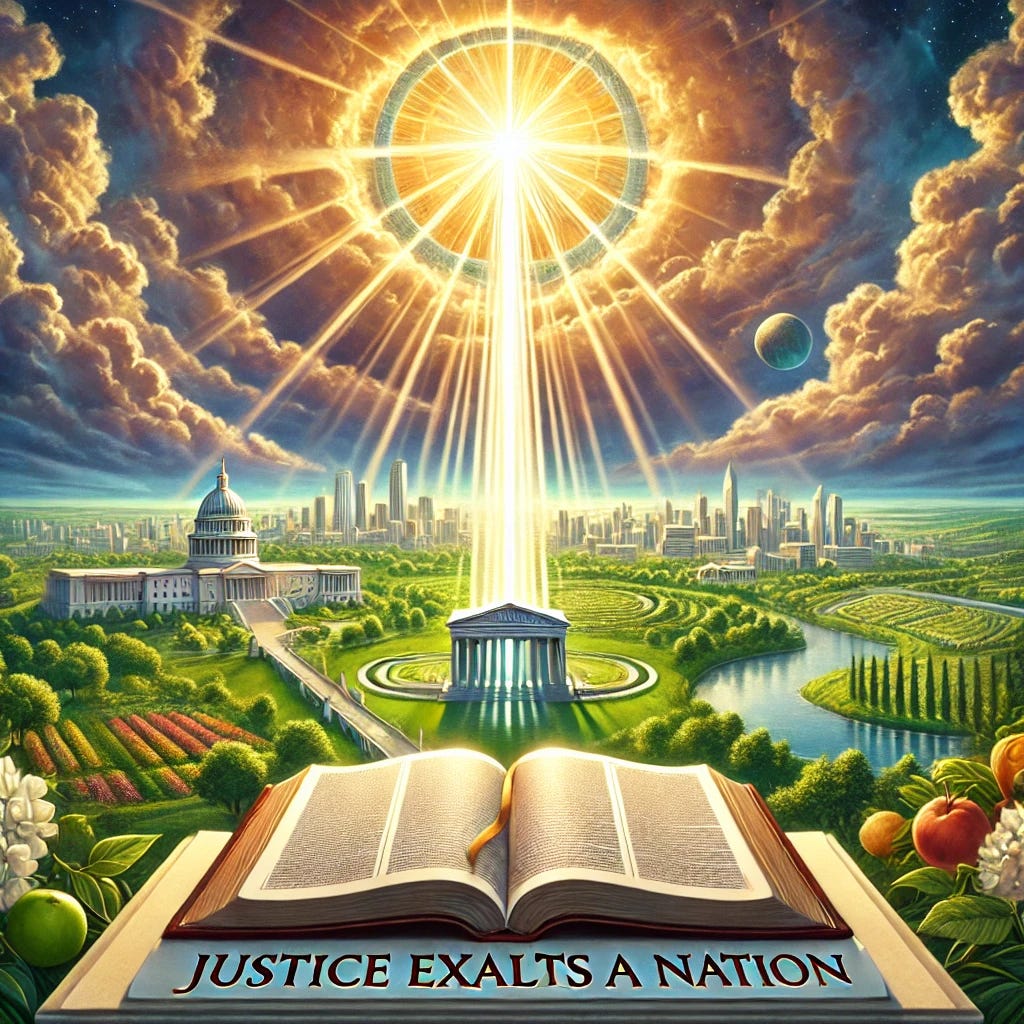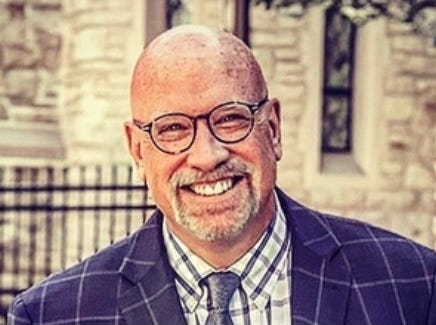"Justice exalts a nation, but sin is a reproach to any people." (Proverbs 14:34)
This profound passage from Proverbs calls us to reflect on the nature of national greatness. The temptation to measure a nation’s worth by its territory, wealth, or history is strong, but Proverbs refocuses us: the true measure lies in its relationship with God, embodied in the practice of justice. This perspective is not only scriptural but deeply rooted in the teachings of the early Church Fathers and the Church, which emphasize the transformative power of faith in God in shaping both individual lives and societal structures.
Justice: The Foundation of National Greatness
Proverbs 14:34 underscores justice as the cornerstone of a nation’s greatness. Justice, as understood in biblical and Church traditions, transcends legalistic definitions. It is a profound moral principle rooted in God’s law, calling for right relationships between individuals and with God.
Saint Augustine of Hippo, a towering figure among the early Church Fathers, wrote extensively about justice in his work The City of God. Augustine argued that a society’s greatness depends not on its temporal achievements but on its adherence to divine justice. He posed a provocative question: "What are kingdoms without justice but great robberies?" For Augustine, justice is inseparable from the worship of the one true God. A nation that rejects God inevitably descends into chaos, as human pride and sin distort its priorities.
Similarly, Saint Ambrose of Milan taught that true justice originates in God’s law. In his treatise On the Duties of the Clergy, Ambrose emphasized that justice involves not only fairness in human dealings but also devotion to God. He wrote, "Where God is denied, there can be no justice, for He is the source of all righteousness."
The Church’s teaching aligns with this wisdom. The Compendium of the Social Doctrine of the Church asserts that justice is the moral foundation of society, fostering the common good and reflecting divine order. Justice, in its fullest sense, encompasses respect for human dignity, protection of the weak, and obedience to God’s commandments.
Sin: A Reproach to Any People
Proverbs contrasts the exaltation of justice with the reproach of sin. Sin, the rejection of God’s law, brings disgrace upon a nation. The Hebrew word for "reproach" in this verse conveys a sense of shame and dishonor, vividly portraying the consequences of moral decay.
Saint John Chrysostom, known as the "golden-mouthed" preacher, often warned against the societal repercussions of sin. He observed that sin corrodes not only individuals but also communities, undermining their cohesion and purpose. In his Homilies on the Statues, he stated, "When a nation disregards God’s law, it sows the seeds of its own destruction."
This teaching resonates deeply in Christian thought. The Church views sin as the ultimate cause of societal discord, manifesting in injustices such as poverty, corruption, and violence. Pope Benedict XVI, in his encyclical Caritas in Veritate, noted that "when the good of the person is subordinated to the logic of power and profit, it leads to social fragmentation and moral decline."
The Role of Faith in National Life
Proverbs 14:34 invites us to consider the importance of faith in shaping a nation’s character. Faith, as both a personal and collective virtue, aligns human actions with divine will, fostering justice and harmony.
The early Church Fathers consistently emphasized the necessity of faith for societal well-being. Saint Basil the Great wrote that "a community without faith in God is like a ship without a rudder, tossed about by the winds of human passions." Basil’s vision of a God-centered society included care for the poor, equitable governance, and communal worship, all underpinned by faith.
The Church carries forward this vision, teaching that faith is essential for cultivating the virtues needed for justice and peace. The Catechism of the Catholic Church (CCC 2297) states that "faith enlightens human society by fostering the moral virtues that sustain justice and the common good." Faith shapes not only individual lives but also the moral fabric of nations.
The Centrality of God in National Identity
The relationship between God and national identity is a recurring theme in Church teaching. Pope John Paul II often spoke of the "soul of a nation," rooted in its recognition of God’s sovereignty. During his historic visit to Poland in 1979, he proclaimed, "A nation’s greatness lies not in its military might or economic power but in its fidelity to God and the moral law."
This principle is evident in the biblical history of Israel, which provides a blueprint for understanding national identity. When Israel remained faithful to God, it flourished; when it turned to idolatry and injustice, it faced ruin. The prophets consistently linked the nation’s fate to its moral and spiritual state.
The United States, like all nations, is called to reflect on this wisdom. While it boasts vast resources, technological innovation, and a rich history, its ultimate greatness depends on its relationship with God. A society that prioritizes secularism and materialism over faith risks losing its moral compass.
The Role of the Church in Promoting Justice
The Church’s mission includes promoting justice as a reflection of God’s kingdom. Through its social teachings and charitable works, the Church seeks to address societal injustices and uphold human dignity.
Saint Thomas Aquinas, in his Summa Theologica, described justice as a cardinal virtue that perfects human relationships. He distinguished between commutative justice (fairness in exchanges), distributive justice (equitable allocation of resources), and legal justice (the common good). Aquinas emphasized that justice is incomplete without charity, which directs it toward God.
God in the Life of Individuals and Nations
The greatness of a nation ultimately depends on the sanctity of its people. Saint Gregory of Nyssa observed that "a holy nation begins with holy individuals." Personal conversion and communal worship are essential for fostering a culture of justice.
The Church encourages the faithful to integrate their spiritual and civic lives. The Catechism (CCC 2239) teaches that "love of country and obedience to its lawful authorities derive from the commandment to honor one’s father and mother." However, this patriotism must be rooted in love for God, ensuring that national loyalty does not conflict with moral principles.
The Call to Action
Proverbs 14:34 challenges us to reimagine the criteria for national greatness. We are called to advocate for a God-centered vision of society that prioritizes justice and rejects sin. This requires both personal holiness and collective action.
The early Church Fathers and Church teaching provide a roadmap for this mission. By fostering faith, promoting justice, and living in obedience to God’s law, we can contribute to the exaltation of our nation. Let us heed the wisdom of Proverbs and commit to building a society that honors God, upholds justice, and serves the common good.
In conclusion, the greatness of a nation lies not in its material achievements but in its fidelity to God. Proverbs 14:34 reminds us that justice exalts a nation, while sin brings disgrace. By embracing the teachings of the Church and living out our faith, we can help transform our nation into a beacon of justice and righteousness. As Saint Augustine wrote, "The earthly city is a pilgrimage toward the heavenly city, where true justice reigns." May our journey as individuals and as a nation be guided by this eternal truth.
Welcome to the St Michael’s Group! In a world facing a decline in religious belief and an increase in moral confusion, the need to reignite our faith has never been more critical. Religion’s capacity to offer meaning, foster ethical behavior, and build cohesive communities is vital for countering the spread of spiritual apathy and the influence of evil. By renewing our commitment to faith, we can combat the forces that seek to divide and weaken us. Reigniting our faith lives, therefore, is not just a personal endeavor but a collective responsibility. It is essential for preserving the moral and spiritual fabric of our society, ensuring that love, compassion, and justice continue to be the guiding principles of human existence.
This is why I started the St. Michael’s Group Substack and Podcast. Join us today stmichaelsgroup.substack.com and let’s start a movement of reigniting faith, family, and formation back into our lives.
This is Dr. Currie Myers. I am an applied criminologist and criminal justice ethicist. I have been on faculty in the criminology department at Benedictine College for over 13 years and was a career law enforcement officer for 24 years. Most importantly I have a beautiful family. My wife and I have been married for 37 years, and we have five children and 10 grandchildren. You can view my work on applied criminology at drcurriemyers.substack.com. Have a great and blessed week and please subscribe and share this podcast with others. And more importantly, if you are struggling in life and need someone to talk to, we have a chat function that you can contact me directly. And if you wish for me to speak at one of your events, please contact (catholicspeakers.com) to schedule.
Are you interested in helping to fund our work? Go to this link About - St Michael's Group and you can visit our PayPal QR Code, or you can reach out to me in our chat function for further directions. It would be much appreciated!
About the Author: Dr Currie Myers, America's Criminologist - Author, Convert, Family Issues, Fatherhood, Men's Issues, Motivational, Pornography, Radio / TV, Social Issues, Spiritual Warfare, Virtues Catholic Speaker Contact (catholicspeakers.com) for Dr. Myers to speak at your event!

















Share this post